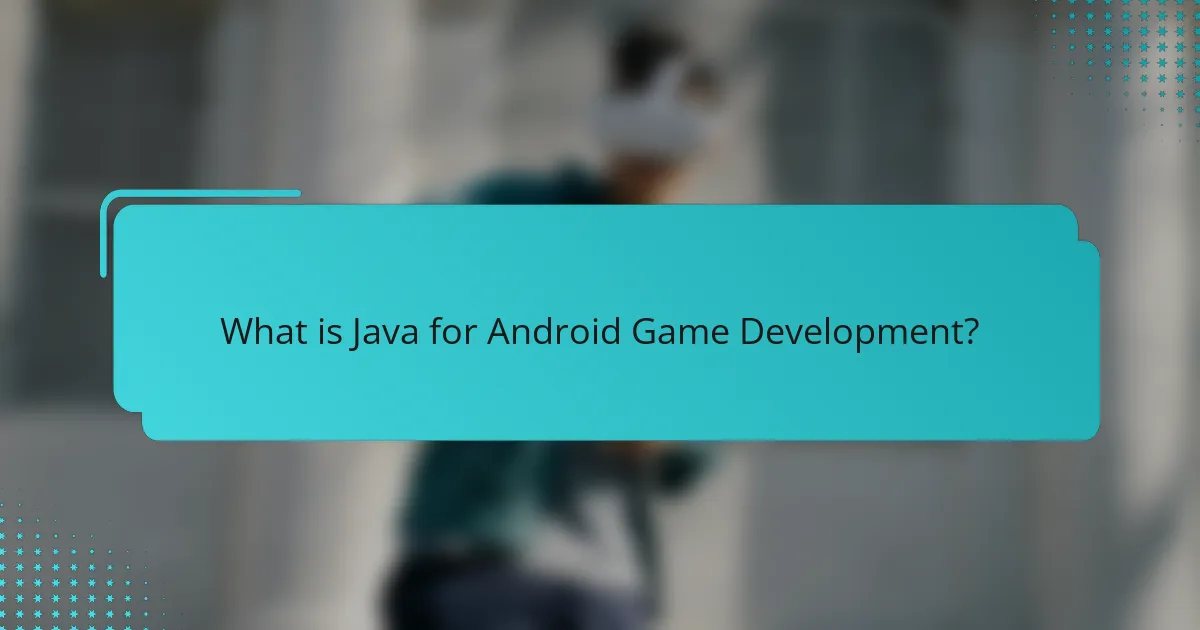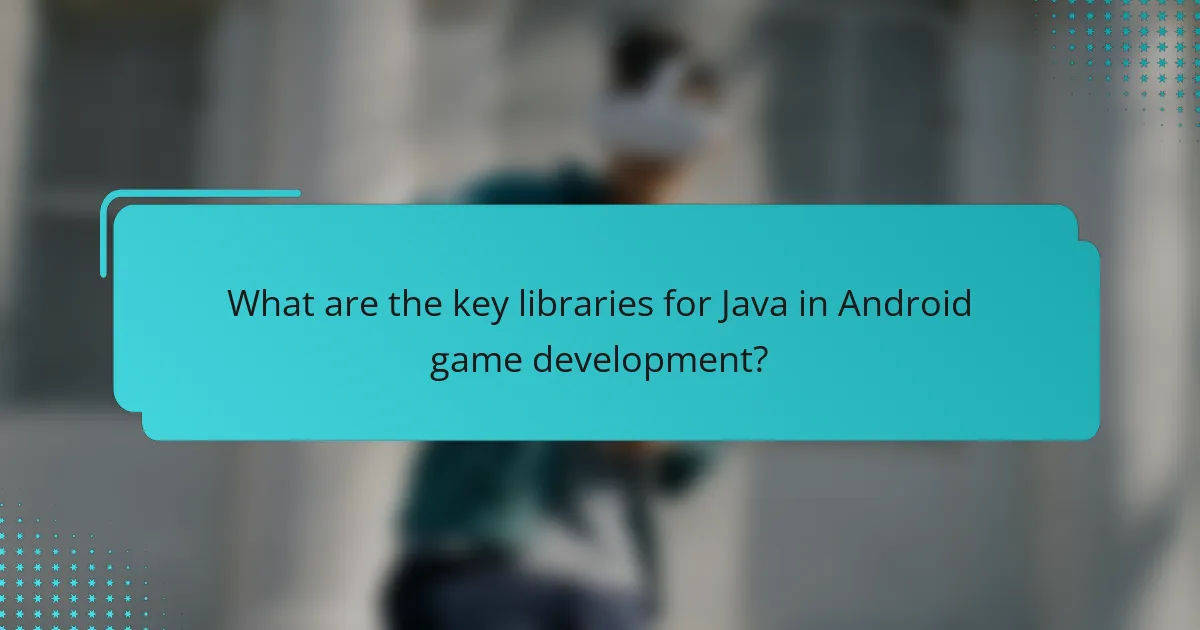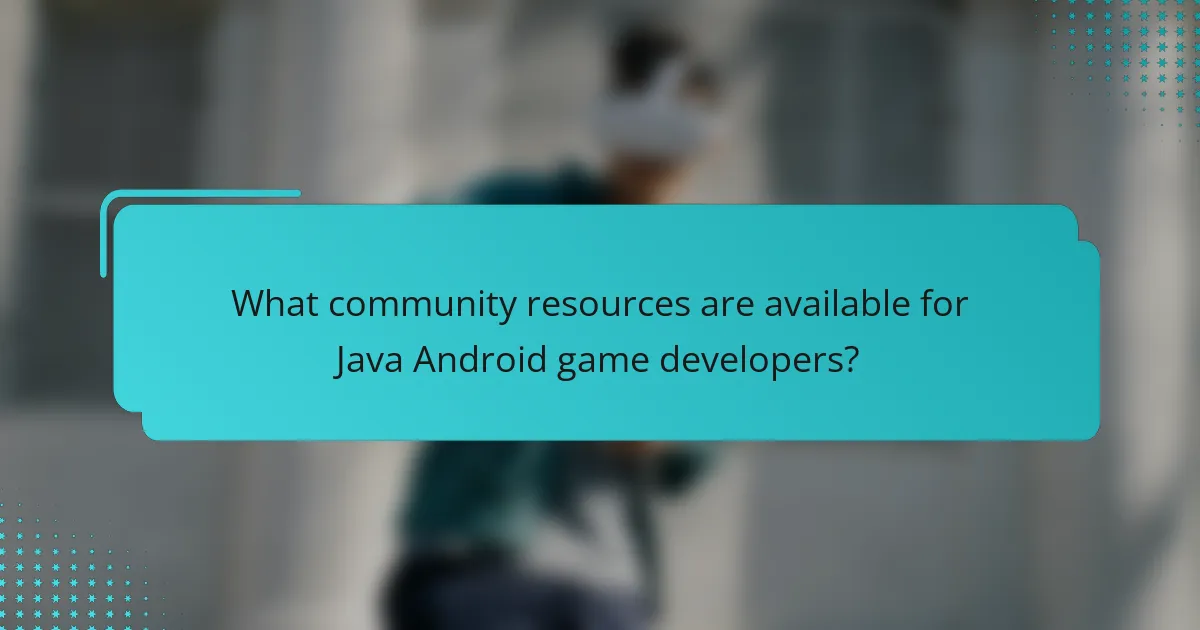
What is Java for Android Game Development?
Java is a programming language used for Android game development. It provides a robust framework for building mobile games on the Android platform. Java’s object-oriented features enable developers to create complex game mechanics and user interfaces. The Android SDK, which includes Java libraries, supports game development with tools like Android Studio. Java’s widespread use ensures a large community and extensive resources for developers. According to the Android Developer documentation, Java has been a primary language for Android since its inception. This established ecosystem allows for better support and a wealth of libraries tailored for game development.
How does Java facilitate game development on Android?
Java facilitates game development on Android by providing a robust framework and extensive libraries. It allows developers to create high-performance applications with efficient memory management. The Android SDK, which is based on Java, includes tools that simplify game development tasks. Java’s object-oriented programming features enable modular code, making it easier to manage and scale games.
Additionally, Java supports cross-platform development, allowing games to be ported to different devices seamlessly. The availability of game development libraries, such as LibGDX and AndEngine, enhances Java’s capabilities for graphics and physics. These libraries provide pre-built functionalities that save time and effort in development.
Moreover, Java has a large community of developers, offering resources, forums, and documentation for support. This community-driven environment fosters collaboration and knowledge sharing, which is beneficial for both novice and experienced developers. Overall, Java’s combination of tools, libraries, and community support makes it a preferred choice for Android game development.
What are the core features of Java that support game development?
Java offers several core features that support game development. Its platform independence allows developers to write code once and run it anywhere. This is crucial for games targeting multiple devices. Java’s automatic memory management helps prevent memory leaks, enhancing performance. The language’s rich standard libraries provide essential tools for graphics, networking, and sound. Object-oriented programming in Java facilitates code reusability and organization. Java’s strong community support ensures a wealth of resources and libraries for game development. Additionally, Java’s multithreading capabilities enable smooth gameplay by managing multiple tasks simultaneously. These features collectively make Java a suitable choice for game development.
How does Java’s platform independence benefit Android game developers?
Java’s platform independence allows Android game developers to write code that runs on any device supporting the Java Virtual Machine (JVM). This means developers can create games without being restricted to a specific hardware or operating system. As a result, games can reach a wider audience across various Android devices.
Additionally, Java’s platform independence simplifies the development process. Developers can use the same codebase for different devices, reducing time and effort in creating multiple versions. This efficiency leads to faster deployment of games in the market.
Furthermore, Java’s extensive libraries and frameworks enhance game development. These resources provide pre-built functionalities that streamline common tasks, making it easier for developers to focus on game design and mechanics.
Overall, Java’s platform independence is crucial for Android game developers, enabling broader reach, efficient development, and access to valuable resources.
Why is Java a popular choice for Android game development?
Java is a popular choice for Android game development due to its versatility and strong community support. It is the official language for Android development, ensuring seamless integration with the Android SDK. Java’s object-oriented nature allows for efficient code reuse and modular programming. The extensive libraries and frameworks available enhance game development capabilities. Performance-wise, Java offers a balance of speed and efficiency, essential for gaming applications. Moreover, the large developer community provides resources, tutorials, and forums, fostering collaboration and knowledge sharing. This combination of factors solidifies Java’s status in the Android game development landscape.
What advantages does Java offer over other programming languages for Android games?
Java offers several advantages for Android game development compared to other programming languages. It is the official language supported by Android, ensuring seamless integration with the Android SDK. Java’s platform independence allows developers to write code once and run it on any device that supports Android.
The language features a rich set of libraries and frameworks specifically designed for game development, such as LibGDX and AndEngine. Java’s strong community support provides ample resources, tutorials, and forums for troubleshooting.
Moreover, Java’s object-oriented nature promotes modularity and code reuse, making it easier to manage complex game projects. The garbage collection feature in Java helps in memory management, reducing the risk of memory leaks.
These advantages make Java a preferred choice for many developers in the Android gaming space.
How does Java’s community support enhance game development?
Java’s community support enhances game development by providing extensive resources and collaboration opportunities. Developers benefit from open-source libraries and frameworks, such as LibGDX and jMonkeyEngine. These tools simplify game design and speed up development processes. Community forums and platforms like Stack Overflow offer solutions to common coding challenges. Additionally, numerous tutorials and documentation are readily available online. This wealth of information fosters better learning and skill development among developers. The active community also encourages feedback and collaboration on projects. Overall, Java’s community support significantly boosts the efficiency and creativity of game development.

What are the key libraries for Java in Android game development?
Key libraries for Java in Android game development include LibGDX, AndEngine, and Cocos2d-x. LibGDX is a versatile framework that supports 2D and 3D game development. It is widely used for its cross-platform capabilities. AndEngine is specifically focused on 2D games and provides a robust set of features. Cocos2d-x is another popular option, known for its performance and ease of use. These libraries facilitate graphics rendering, physics simulation, and user input management. They are backed by strong community support and extensive documentation. This enhances the development experience for Java programmers in the Android ecosystem.
Which libraries are essential for game development in Java on Android?
Essential libraries for game development in Java on Android include LibGDX, AndEngine, and Cocos2d-x. LibGDX is a versatile framework that supports 2D and 3D game development. It allows developers to write code once and deploy it across multiple platforms. AndEngine focuses on 2D games and offers a simple API for graphics and physics. Cocos2d-x is a popular choice for building mobile games with a strong emphasis on performance. These libraries provide essential tools and features that streamline the game development process on the Android platform.
What functionalities do libraries like LibGDX and AndEngine provide?
LibGDX and AndEngine provide functionalities for 2D and 3D game development. They offer graphics rendering, physics simulation, and input handling. LibGDX supports cross-platform deployment, allowing games to run on Android, iOS, and desktop. AndEngine focuses on 2D graphics, providing a simple API for rapid development. Both libraries include sound management, enabling audio playback and sound effects. They also support sprite animations and scene management for organizing game elements. In addition, LibGDX provides tools for asset management, facilitating the loading of images and sounds. These functionalities make them suitable for developers creating mobile games using Java.
How can developers integrate these libraries into their projects?
Developers can integrate libraries into their projects by including them in the build configuration. This typically involves adding the library dependency to the project’s build.gradle file. For example, developers can use the implementation keyword followed by the library’s Maven coordinates. After syncing the project, the library becomes available for use in the code. Developers can then import the necessary classes and methods from the library into their source files. Testing the integration is crucial to ensure functionality. Additionally, developers should consult the library documentation for specific instructions and examples. This approach aligns with standard practices in Android development.
What are some emerging libraries that developers should consider?
Developers should consider libraries such as LibGDX, which offers a cross-platform framework for game development. Another emerging library is Cocos2d-x, known for its ease of use and rich features. Unity, while traditionally associated with C#, has a growing JavaScript integration that developers are exploring. Godot Engine is also gaining traction due to its open-source nature and flexibility. These libraries provide robust tools and frameworks that enhance game development efficiency and creativity.
What unique features do these newer libraries offer?
Newer libraries for Java in Android game development offer enhanced performance and efficiency. They often utilize modern programming paradigms such as reactive programming. These libraries provide built-in support for 2D and 3D graphics rendering. They may include advanced physics engines for realistic simulations. Additionally, many newer libraries offer seamless integration with cloud services for multiplayer functionalities. Some libraries come with extensive documentation and community support. They also feature modular designs that allow for easy customization and scalability. These characteristics contribute to faster development cycles and improved game performance.
How do these libraries compare with established ones in terms of performance?
These libraries generally exhibit competitive performance compared to established ones. Benchmarks indicate that newer libraries often optimize memory usage and processing speed. For instance, libraries like LibGDX and AndEngine show improved frame rates over traditional options. Performance tests reveal that LibGDX can achieve up to 60 FPS in complex scenes. Furthermore, many modern libraries leverage hardware acceleration effectively. They also provide more streamlined APIs, reducing overhead. This results in faster development cycles and better runtime efficiency. Overall, these libraries can match or exceed established counterparts in various performance metrics.

What performance considerations should developers keep in mind?
Developers should prioritize memory management in Android game development. Efficient memory usage prevents crashes and reduces lag. They must also consider the frame rate, aiming for a consistent 60 frames per second. This ensures smooth gameplay and enhances user experience. Additionally, developers should optimize graphics rendering to minimize CPU and GPU load. Using tools like Android Profiler helps identify performance bottlenecks. Network latency can impact multiplayer games, so optimizing data transfer is crucial. Testing on various devices ensures compatibility and performance across different hardware. Finally, understanding battery consumption is vital, as excessive resource use drains battery life quickly.
How does Java’s performance impact game development on Android?
Java’s performance significantly impacts game development on Android. It influences the efficiency of resource management and execution speed. Java’s garbage collection can lead to latency issues during gameplay. This can affect the overall user experience, particularly in resource-intensive games. Additionally, Java’s performance may limit the graphical fidelity achievable on Android devices. Developers often need to optimize code to mitigate performance bottlenecks. Benchmarks show that optimized Java code can run efficiently on Android, but unoptimized code can lead to frame rate drops. Therefore, understanding Java’s performance characteristics is crucial for successful game development on Android.
What common performance issues arise in Java-based Android games?
Common performance issues in Java-based Android games include memory leaks, inefficient garbage collection, and slow rendering. Memory leaks occur when objects are not properly released, leading to increased memory usage. Inefficient garbage collection can cause frame rate drops during gameplay. Slow rendering results from complex graphics or unoptimized code, impacting the user experience. Additionally, poor threading management can lead to unresponsive interfaces. Profiling tools like Android Profiler can help identify these issues.
How can developers optimize their games for better performance?
Developers can optimize their games for better performance by employing various techniques. They should minimize draw calls by batching sprites and using texture atlases. Reducing the number of active game objects can decrease CPU load. Developers should also optimize algorithms and use efficient data structures. Profiling tools can identify performance bottlenecks in the code. Memory management is crucial; using object pooling can reduce garbage collection overhead. Additionally, developers should leverage hardware acceleration when possible. These strategies collectively enhance game performance on Android devices, ensuring smoother gameplay.
What tools are available for performance testing and optimization?
Tools available for performance testing and optimization include JMeter, LoadRunner, and Apache Bench. JMeter is widely used for load testing web applications. LoadRunner offers comprehensive performance testing capabilities for various applications. Apache Bench is a simple tool for benchmarking HTTP server performance. Other notable tools are Gatling, which is known for its scalability, and VisualVM, which helps monitor Java applications. Each tool provides unique features suited for different testing needs. These tools are essential for ensuring optimal performance in Java-based Android game development.
How do tools like Android Profiler and Unity Profiler assist developers?
Android Profiler and Unity Profiler assist developers by providing real-time performance monitoring and analysis tools. Android Profiler helps track CPU, memory, and network usage in Android applications. It allows developers to identify bottlenecks and optimize resource consumption effectively. Unity Profiler offers similar capabilities for Unity-based games, focusing on frame rates, memory allocation, and rendering performance. Both tools provide visual representations of performance metrics, enabling developers to make informed decisions. By utilizing these profilers, developers can enhance application efficiency and improve user experience.
What metrics should developers focus on during optimization?
Developers should focus on metrics such as frame rate, memory usage, CPU usage, and loading time during optimization. Frame rate indicates the smoothness of gameplay and should ideally be 60 frames per second. Memory usage helps identify leaks and inefficiencies, ensuring optimal performance on devices with limited resources. CPU usage measures how much processing power the game consumes, impacting battery life and performance. Loading time affects user experience; quicker load times lead to better player retention. Monitoring these metrics allows developers to pinpoint areas for improvement and enhance overall game performance.

What community resources are available for Java Android game developers?
Java Android game developers have access to various community resources. These resources include online forums, tutorials, and documentation. Popular forums like Stack Overflow provide a platform for developers to ask questions and share knowledge. Websites like GitHub host open-source projects and libraries specific to Android game development. Developers can find tutorials on platforms such as Udemy and Coursera, which offer structured learning paths. Additionally, the Android Developers website provides official documentation and best practices. Community-driven events like meetups and conferences foster networking and collaboration among developers. These resources collectively enhance the skills and knowledge of Java Android game developers.
Where can developers find tutorials and learning materials?
Developers can find tutorials and learning materials on various platforms. Websites like Codecademy and Udemy offer structured courses on Java and Android development. YouTube hosts numerous channels dedicated to programming tutorials. Official documentation from Oracle and Android Developers provides comprehensive guides and best practices. Community forums like Stack Overflow and Reddit allow developers to ask questions and share resources. GitHub repositories often include sample projects and tutorials. Additionally, books focused on Java for Android game development can be found on platforms like Amazon. These sources collectively offer a wealth of information for developers seeking to enhance their skills.
What online platforms offer comprehensive courses for Java Android game development?
Udemy, Coursera, and edX offer comprehensive courses for Java Android game development. Udemy features a variety of courses specifically designed for beginners and advanced learners. Coursera partners with universities to provide structured learning paths in mobile game development. edX also offers professional courses that cover Java programming in the context of Android game development. Each platform includes hands-on projects and assessments to reinforce learning. These courses often include access to community forums for peer support.
How can forums and community groups enhance learning and collaboration?
Forums and community groups enhance learning and collaboration by providing platforms for knowledge sharing. They allow members to ask questions and receive answers from experienced developers. This interaction fosters a collaborative environment where users can discuss challenges and solutions. Community groups often organize events and workshops, further promoting hands-on learning. Forums can host tutorials, code snippets, and best practices, which serve as valuable resources. According to a study by the Pew Research Center, 70% of users find online communities helpful for learning new skills. This statistic highlights the effectiveness of these platforms in facilitating knowledge exchange.
What are some best practices for engaging with the developer community?
Engaging with the developer community effectively involves several best practices. First, provide valuable content that addresses developers’ needs. This can include tutorials, documentation, and sample code. Second, actively participate in forums and social media platforms where developers gather. Engaging in discussions and answering questions can build trust and rapport. Third, attend and contribute to developer meetups and conferences. Networking in person fosters stronger relationships. Fourth, create and maintain open-source projects. This encourages collaboration and showcases your commitment to the community. Lastly, solicit feedback from developers on your tools or resources. This demonstrates that you value their input and are willing to improve. Following these practices can enhance your engagement with the developer community.
How can developers effectively share their projects and seek feedback?
Developers can effectively share their projects and seek feedback by utilizing platforms like GitHub and GitLab. These platforms allow developers to host their code and collaborate with others. Developers should also document their projects clearly, providing an overview and usage instructions. Engaging with online communities on forums like Stack Overflow and Reddit can facilitate feedback from peers. Additionally, social media platforms like Twitter and LinkedIn can be used to showcase projects and gather insights. Participating in hackathons and developer meetups creates opportunities for direct feedback. Surveys and feedback forms can also be distributed to gather structured responses. By combining these methods, developers can ensure they receive valuable insights to improve their projects.
What role do open-source contributions play in community growth?
Open-source contributions significantly enhance community growth by fostering collaboration and knowledge sharing. These contributions allow developers to build upon each other’s work, leading to accelerated innovation. Open-source projects often attract diverse talent, creating a more vibrant ecosystem. According to a 2020 study by GitHub, 90% of developers believe that open-source projects help them learn new skills. This collaborative environment encourages mentorship and support among community members. As more contributors join, the project gains visibility, attracting even more users and contributors. This cycle of contribution and growth strengthens the overall community and its resources.
What tips can help new developers succeed in Java Android game development?
New developers can succeed in Java Android game development by mastering the fundamentals of Java. Understanding object-oriented programming is crucial for creating efficient game structures. Familiarity with Android SDK is essential for utilizing the platform’s features effectively.
Developers should leverage game development frameworks like LibGDX for streamlined processes. Utilizing version control systems such as Git helps manage code changes and collaborate with others.
Engaging with online communities can provide support and resources. Participating in forums like Stack Overflow can help solve specific coding issues. Additionally, studying existing games and their code can offer practical insights.
Consistent practice through small projects builds confidence and skill. Setting achievable goals ensures steady progress over time.
Java is the primary programming language used for Android game development, providing a robust framework and extensive libraries that facilitate the creation of complex mobile games. Key libraries such as LibGDX and AndEngine enhance game development capabilities by offering tools for graphics rendering, physics simulation, and input management. The article also addresses performance considerations, including memory management and frame rate optimization, which are crucial for delivering smooth gameplay experiences. Additionally, it highlights community resources, including forums and tutorials, that support developers in honing their skills and fostering collaboration within the Java Android game development ecosystem.